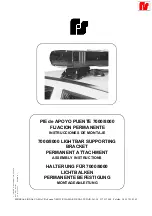
TROUBLESHOOTING
TROUBLESHOOTING
FOREWORD
• Refer to Section Gl and thoroughly read and understand the basic flow of troubleshooting in order to properly
perform the procedures.
BASIC INSPECTION
STEP
INSPECTION
RESULTS
ACTION
1
Perform the mechanical system test.
See K2-21 MECHANICAL SYSTEM TEST
Is mechanical system okay?
Yes
Go to next step.
No
Repair or replace any defective parts according to
inspection result.
2
Turn IG SW to ON.
When selector lever is moved, does the selector
illumination indicate synchronized position to
lever location? Also, when other ranges are
selected from N or P during idling, does vehicle
creep within 1 or 2 seconds?
Yes
Go to next step.
No
Inspect selector lever and TR switch. Repair or
replace defected areas.
See K2-55 SELECTOR LEVER INSPECTION
See K2-30 TRANSAXLE RANGE (TR) SWITCH
INSPECTION
If selector lever and TR switch are okay, go to next step.
3
Inspect the ATF color and condition.
See K2-28 AUTOMATIC TRANSAXLE FLUID
(ATF) INSPECTION
Are ATF color and odor normal?
Yes
Go to next step.
No
Repair or replace any defective parts according to
inspection result.
Flush ATX and cooler line as necessary.
4
Perform the line pressure test.
See K2-21 MECHANICAL SYSTEM TEST,
Line Pressure Test
Is line pressure okay?
Yes
Go to next step.
No
Adjust accelerator cable as necessary.
Repair or replace any defective parts according to
inspection result.
5
Perform the stall test.
See K2-21 MECHANICAL SYSTEM TEST,
Stall Test
Is stall speed okay?
Yes
Go to next step.
No
Repair or replace any defective parts according to
inspection result.
6
Inspect the value at the following PIDs using the
NGS tester.
See F1 -25 PCM INSPECTION
• ATFT
• ATFTV
• TP V
• TR
• TR V
• VS
• TCS
Is PID value okay?
Yes
Perform symptom troubleshooting and follow
procedures.
No
Repair or replace any defective parts according to
inspection result.
!
SYMPTOM TROUBLESHOOTING ITEM TABLE
• Use the chart below to verify the symptoms of the trouble in order to diagnose the appropriate area.
No.
TROUBLESHOOTING ITEM
DESCRIPTION
1
Vehicle does not move in D, S, L ranges, or
in R position
Vehicle does not move when AP depressed.
2
Vehicle moves in N position
Vehicle creeps in N position.
Vehicle creeps if brake pedal is not depressed in N position.
3
Vehicle moves in P position, or parking gear
does not disengage when P is disengaged
Vehicle rolls when on a downward slope and tires do not lock in P
position.
Tires are locked when P is disengaged, vehicle does not move in D,
S, L ranges, and R position when AP is depressed, and engine
remains in stall condition.
K2-136
Summary of Contents for 626 Station Wagon
Page 25: ...CONTROL SYSTEM WIRING DIAGRAM With Immobilizer System OUTLINE F1 4 ...
Page 183: ...CONTROL SYSTEM COMPONENT LOCATION F2 7 ...
Page 204: ...MANUAL TRANSAXLE FEATURES OUTLINE J 2 OUTLINE OF CONSTRUCTION J 2 SPECIFICATIONS J 2 D J 1 ...
Page 266: ...SHIFT MECHANISM 6 Apply grease to the cam as shown K2 59 ...
Page 418: ...TROUBLESHOOTING KEYLESS ENTRY SYSTEM ON BOARD DIAGNOSTIC FUNCTION S 37 ...
Page 454: ...WARNING AND INDICATOR SYSTEM O p e ra tin g O rd e r T 32 ...
















































